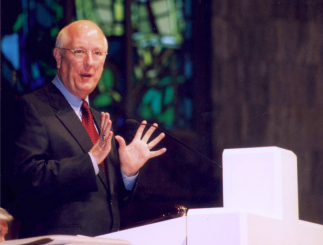It is reported as a true story. Only the names were changed to protect the guilty. Sadly the story typifies the worst about relationships between a pastor and a church.
In another part of the United States a young Ph.D. graduate from a Southern Baptist seminary went to a county-seat First Baptist Church. The church was widely known in its region. Many of the leading families of the area had been members there for generations. The pastor was well received. He was a good preacher, worked hard and made a positive impression on the community.
The church complex was impressive. It was obvious to all that no expense was spared in reflecting the congregation’s love for God through the quality of the architecture, landscaping, lighting, furnishings, sound system, musical instruments, resources and all the other amenities associated with a place to worship.
Such love was not reflected in the church parsonage, however. It was a modest two-bedroom home. The furnishings and appliances were minimal but after living in seminary housing the young pastor, his wife and their 3-year-old son were glad to have it.
Pastor’s request rejected
A few months after arriving in the community the pastor’s family learned a second child was expected. Because the parsonage was already tight, the pastor asked if the church would build another bedroom onto the home that would serve first as a nursery and then a bedroom for the new child.
The new pastor expected quick approval. Things were going well. There was more than enough money in the bank to pay for the addition and the need was obvious. He was stunned when the deacons summarily rejected his request.
That is when the pastor’s wife decided to go to the most influential man in the region to make the case for the addition to the parsonage. He was the biggest employer and wealthiest member of the church and, in fact, the one who really “ran the church.” The man had always been encouraging so she was sure he would understand.
She went to his office and made her case — a small home already filled, a new baby on the way, resources available for the project and the prospect of a long ministry at the church.
Merely ‘hired hands’
The reply went something like this: “We really like you and your husband. You are doing good work. But there are two kinds of people in this world — pickers and growers. I am a ‘grower’ and in the end you and your husband are ‘pickers.’”
The pastor’s wife was devastated. There would be no nursery. More importantly, she learned for the first time that she and her husband were “hired hands” as far as church leadership was concerned. They were not partners in ministry with other church members. They were not members of the “church family.” They were and always would be outsiders.
The pastor was not God’s under-shepherd of the church in the minds of church leaders. He was a performer to make the members feel good about themselves and to conduct the rituals marking various seasons of life. All of this and more were reflected in the church’s determination to provide the pastor with the bare minimum of support necessary to keep someone in that position.
It is a crude story filled with ugly implications. Unfortunately some ministers can relate to it.
The pastor who has been at his church for 10 years and in all of that time has not received a single salary adjustment can relate. He can relate because a support staff member has seen her salary doubled during the same 10 years while he has received nothing. When he asked himself why, the only reason he comes up with is that the support staff member is related to a number of people in the church.
Like others, health care costs have skyrocketed for some pastors and their families. Paying higher premiums for medical insurance means fewer dollars for other necessities. This has caused more than one pastor to ask for health care adjustments in the church budget only to be rejected.
Like the man in the story, some churches seem bent on providing the pastor with as little as possible.
Thankfully these stories reflect a minority of churches. Most churches love their pastor and staff members and try to demonstrate their love and appreciation through financial support. Most churches understand the need for annual adjustments to salaries and expense items like insurance and retirement for their ministers. These are built-in costs just like utility costs.
Most churches incorporate the pastor and family into the fellowship of the church and become partners in ministry with them. Most churches accept their pastor as the under-shepherd of the congregation.
Consider your ministers’ needs
But there is that occasional church that reflects its unhealthy and unbiblical attitudes and behaviors through the way it treats pastor and staff. Circumstances might be different but that kind of church practices a “grower and picker” mentality toward its pastor. It can happen in a church large or small, in a city or open country location. It is about mindset, not demographics.
Most Alabama Baptist churches are working on their budgets for 2015. Make sure the needs of the pastor and staff are considered in the process. That may mean personal interviews about salary and benefits but remember it is hard for most pastors to ask for increased compensation. More often it takes a champion — a committee or an individual — who will make sure their ministers are cared for financially in a way appropriate to the capacity of the church.
In God’s family, there is no place for division based on “pickers and growers.”




Share with others: